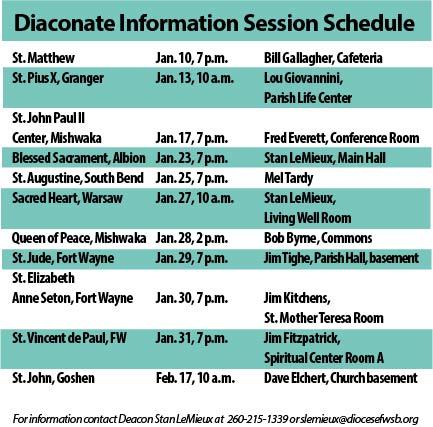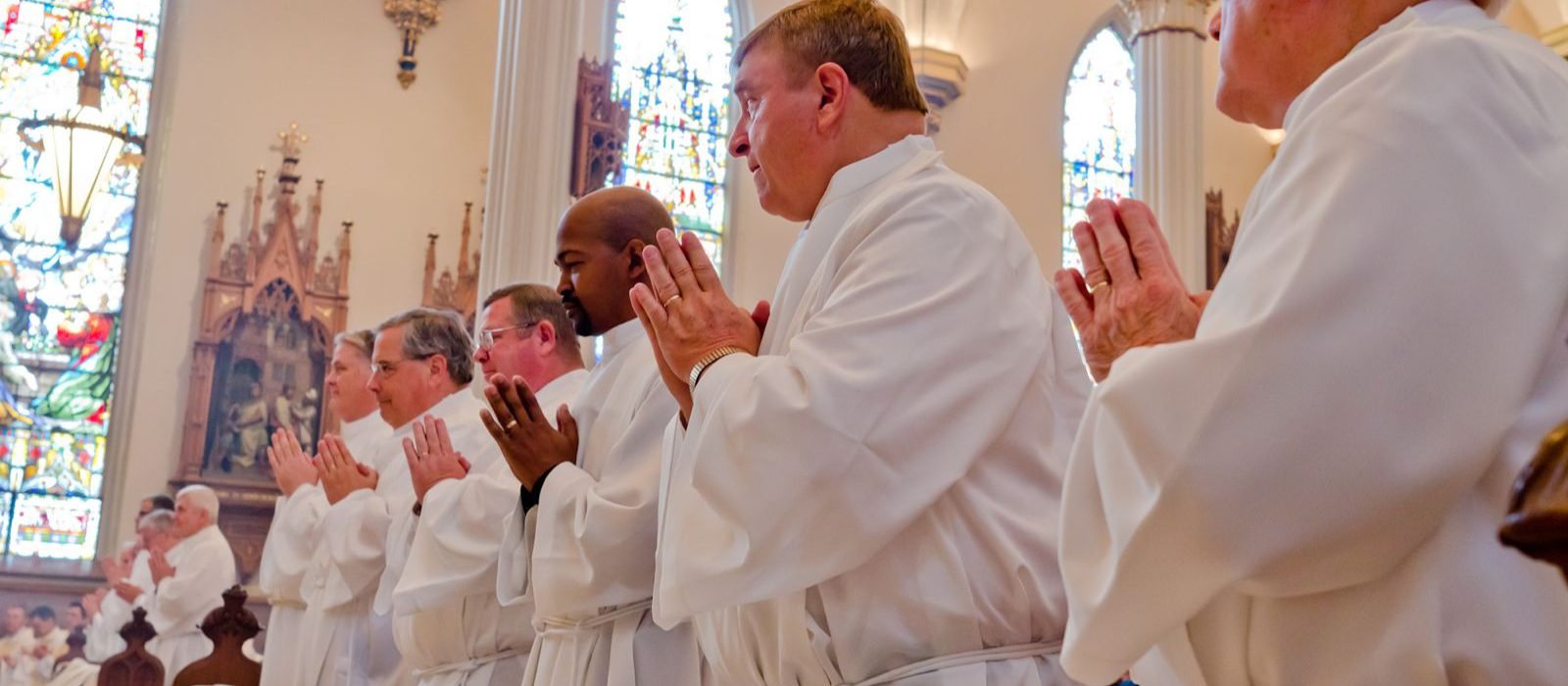January 3, 2018 // Diocese
Those called to diaconate encouraged to ‘Come and See’
The Diocese of Fort Wayne-South Bend is looking for a few faith-filled men — up to 25 of them — willing to consider beginning formation for the permanent diaconate. Pastors throughout the diocese have been encouraged to speak with and facilitate the discernment of men of deep and proven faith, integrity and character who profess an interest in serving the Church as a deacon and who meet other requisite criteria.
 Deacons are ordained members of the clergy who promise to obey their bishop. Besides human and spiritual qualifications, they must undergo a year of aspirancy, three years of rigorous study and pastoral ministry, and undergo scrutiny and discernment by the Church. Like priests, they can preach, teach, lead prayer, baptize and witness weddings, although they cannot celebrate Mass or forgive sins. They are often involved in counseling as well as visiting the sick. Unlike most priests, they may be married men; in that case, the full consent of their wives is essential.
Deacons are ordained members of the clergy who promise to obey their bishop. Besides human and spiritual qualifications, they must undergo a year of aspirancy, three years of rigorous study and pastoral ministry, and undergo scrutiny and discernment by the Church. Like priests, they can preach, teach, lead prayer, baptize and witness weddings, although they cannot celebrate Mass or forgive sins. They are often involved in counseling as well as visiting the sick. Unlike most priests, they may be married men; in that case, the full consent of their wives is essential.
The minimum age for ordination to the diaconate is 35, and interested candidates should be 65 or younger when a formation program begins in January 2019. Men interested in exploring this vocation are invited to one of several “Come and See” sessions at parishes across the diocese, during which current deacons will share their stories and answer questions.
Bishop Leo Pursley ordained the first permanent deacons in the Diocese of Fort Wayne-South Bend in 1973, but none were ordained after 1975 until Bishop John M. D’Arcy began the process for the 11 men ordained by Bishop Kevin C. Rhoades in 2011. There is currently a class of Spanish-speaking deacon candidates scheduled for ordination in June 2018.
Deacon Stan LeMieux, director of the formation program, said he’d been thinking about the diaconate for about five years before his pastor nominated him. He is currently serving in his home parish, St. Patrick, Ligonier.
“What I’ve enjoyed most, besides teaching and ministering to the sick, is growing deeper in prayer with fellow parishioners,” he said. Although people sometimes find his role confusing, he feels deacons provide an important bridge between priests and laymen, who are heavily involved in the demands of work and family life.
Deacon Jim Tighe of St. Jude Parish, Fort Wayne, was surprised when his pastor nominated him, but it made sense. Besides being a seminarian during college, he was involved in liturgical ministry and teaching in the parish. After he and his wife Pat lost two daughters in a 1999 car accident, he began to counsel other parents whose faith was challenged by the death of their children, even making a presentation at the 2000 Eucharistic Congress. When he entered the deacon formation program, Deacon Tighe said he wasn’t sure he’d persevere; but about halfway through, he realized this wasn’t his idea but rather God calling him.
Deacon Bob Byrne had a similar experience. When he realized the Church was asking him to explore this vocation, he agreed to give it his best shot. He figured if it wasn’t supposed to happen, he’d wash out during the process. Instead, he woke up on the day of his ordination praying Psalm 57:8, “My heart is ready, God. My heart is ready.”
Deacon Tighe said his faith has continued to grow as a deacon. “That’s the grace of ordination. The Lord will give me what I need to do what he’s calling me to do.” He rarely says no to anything he’s asked to do, and he loves it all: RCIA, marriage preparation, nursing home visits or working with those who are grieving. “I try not to make plans. My daily prayer is, ‘Here I am, Lord,’ for whatever You send me today.”
Nine of the men ordained in 2011 are serving in their home parishes, but such placement is not guaranteed. Deacon Bob Byrne, for example, was active at St. Anthony de Padua, South Bend, for 24 years but has been a deacon at St. Joseph and Queen of Peace, both in Mishawaka. When he first thought about becoming a deacon in his home Diocese of Rockford, Illinois, he was too young; by the time both his pastor and a former pastor nominated him, he wondered if he might be too old. However, he learned that Bishop D’Arcy was looking for men close to retirement age with grown children, which would leave them more free time for ministry.
After 40 years as a computer programmer, he retired in 2012 but wonders, “Where did my retirement go? I work just as late, and I’m getting up earlier now.”
However, Deacon Byrne loves everything he does — especially adult catechesis, the joy of baptizing babies and getting into school classrooms so young people can understand his vocation. Visiting those in nursing homes has been “a phenomenal blessing. You can see the faith shining in their eyes when they receive Communion.” He has also been impressed with the holiness of the priests with whom he has been privileged to work.
Those who have further questions before one of the sessions may contact Deacon LeMieux at [email protected].
The best news. Delivered to your inbox.
Subscribe to our mailing list today.






